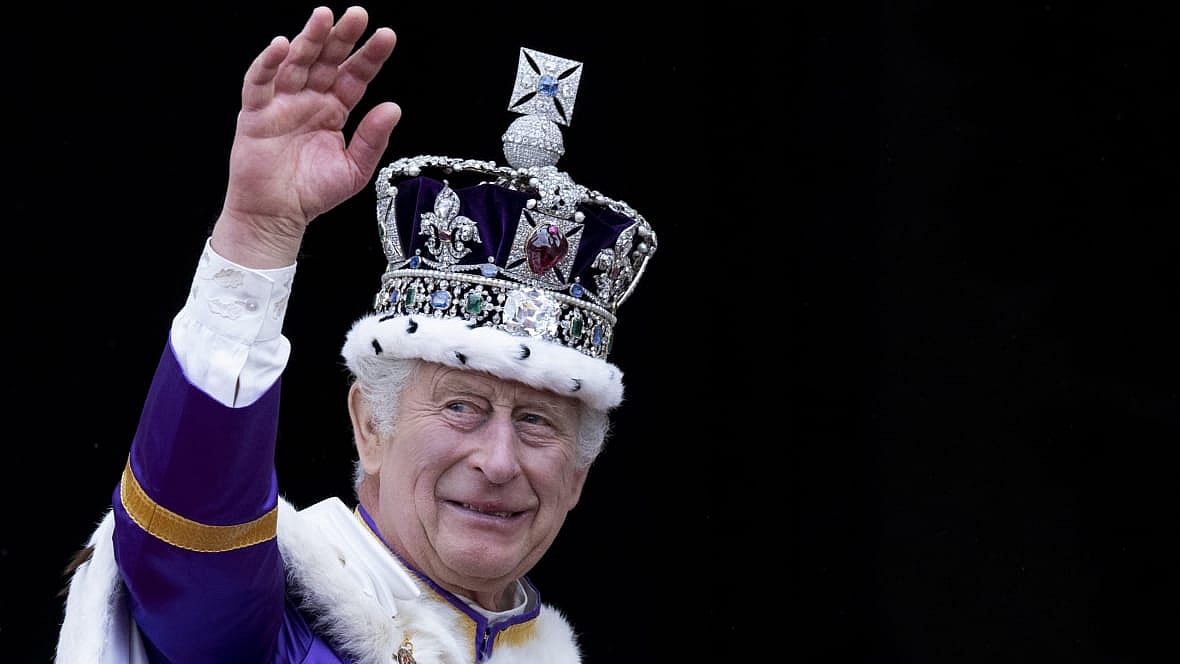“Notes on faith” is theGrio’s inspirational, interdenominational series featuring Black thought leaders across faiths.
As we wrote this week’s note on faith, we were viewing King Charles III’s coronation, noticing a musical presentation of the “Alleluia” composed by a white British woman that was met with a mixed reception on social media. Various online spectators described the commissioned work as “gospel”; others struggled to decipher the inherent conflicts and unspoken significance in the choir’s Afro-descended vocalists singing so beautifully for the British empire. Also, compositions by George Frideric Handel, a confirmed funder of the transatlantic slave trade, were strewn throughout the Coronation Order of Service, illuminating its disregard for the devastating repercussions of colonialism.
In short, symbols of the British empirical legacy abounded in a performance reestablishing its world domination.

(Photo by UK Press Pool/UK Press via Getty Images)
However, it is not lost on us that this transition in power includes becoming the leader of the Church of England, among other roles, a ceremony that last occurred 70 years ago. It is also important to note the Church of England is comprised of predominantly Afro-descended people producing an “African Anglicanism” phenomenon. And its U.S. counterpart, the Anglican Church, is now led by an African-American presiding bishop, The Most Reverend Michael Curry.
Since arriving in the U.K. last year to embark on new career opportunities, we, as married Black theologians, have been inundated with larger diasporic issues. They have included attending a major symposium on reparations that outlined King Charles’ alma mater’s holdings in the slave trade and engaging a working group deployed by the United Nations to the U.K. to report on the issue. Foremost in our minds as Black American faith leaders is the sobering legacy of the crown from a social, biblical, and moral perspective.
Amid all the pomp, circumstance, and pageantry, for the first time in a Royal coronation, there are inclusive religious gestures that go beyond the Christian faith. There is, however, that looming, unresolved significant event that dramatically changed the course of our ancestors’ lives in the name of a misshapen federation of crowns and European Christianity: the transatlantic slave trade.
Moral Dilemma of “The Debt“
What if we tell you the last installment of reparations for slavery in U.K. was paid out in 2015?
In 2018, transatlantic reflection on reparations took a confusing twist when the Bank of England deleted a tweet: “Did you know? In 1833, Britain used £20 million, 40% of its national budget, to buy freedom for all slaves in the Empire. The amount of money borrowed for the Slavery Abolition Act was so large that it wasn’t paid off until 2015. Which means that living British citizens helped pay to end the slave trade.”
The reparations arrangement was made by arguing the loss of revenue the slaveholders would incur in their present and future. That was the British Empire’s narrative for completing its colonial payment plan to slaveholders, aka “planters.”
And yet, the Associated Press reported that when Britain outlawed the slave trade in 1806, it did not harken to the pleas to emancipate enslaved people in territories. Instead, it was delayed until 1833, the same year Britain began to pay reparations.
“Three centuries ago, an enslaved person in Virginia wrote to a leader of the Church of England, begging to be released from “this cruel bondage.” There was no reply from the church, which, at the time, was accumulating a tidy profit from the [transatlantic] slave trade. The handwritten letter from 1723 — whose author says they must remain anonymous for fear they will ‘swing upon the gallows tree’ if exposed — has gone on display in London as part of efforts by the Anglican church to reckon with its historic complicity in slavery.”
Moral Mandate
Family, are we finally on the road towards truly redressing the harms of the slave trade in the U.K. and U.S.?
As faith leaders, we are compelled to discuss the British Royal Crown and how the U.K. and the U.S. amassed their wealth through our enslaved ancestors under the guise of the Christian faith. Christian faith leaders and students of humanity must explore the moral and spiritual implications of the horrific chattel slavery if we are to be the beloved community that Rev. Dr. Martin Luther King, Jr envisioned.
We do not have to go into great detail here about the documented terror of slavery or how the exploitation of enslaved Africans and our descendants fueled the growing economies of both Britain and the United States. Our enslaved ancestors’ bodies were exploited for labor for the production of sugar, tobacco, and other goods that were in high demand, as well as sexual exploitation throughout Europe and the American colonies. Without rendering reparations, the global church community will remain maimed as the slave trade’s moral witness.
From a moral perspective, before we can get to racial reconciliation, we must experience repentance, restoration, and reparation. In particular, reparations are necessary because the legacy of slavery has an ongoing impact on the lives of Black people in Britain and America. Slavery was a system of exploitation that dehumanized and oppressed African and African-descended people, and its effects can still be seen in racial inequalities that persist today.
Bryan Stevenson, human rights activist, attorney, and author of “Just Mercy: A Story of Justice and Redemption” (2014), rightly assessed that tactically, slavery wasn’t abolished; it simply evolved into the prison industrial complex. Along with the Black people disproportionately incarcerated, we know Black people are overrepresented in poverty, limited access to adequate education, food insecurity, climate and energy impacts, medical malpractice, infant mortality rates, and discrimination in housing and hiring practices. Morally, there is a mandate to address these inhumane structures; reparations are a way of acknowledging and redressing these historical and systematic injustices.
The beginning of the coronation sermon given by the Archbishop of Canterbury echoes the moral mandate that we should share as a beloved community. His words:
“What is given today is for the gain of all. For Jesus Christ announced a Kingdom in which the poor and oppressed are freed from the chains of injustice. The blind see. The bruised and broken-hearted are healed.”
These words, rooted in one of the scriptures for the coronation sermon, echo Christ’s “Sermon on the Mount.” Throughout sacred texts, we can read God’s urging of the Creator’s people to seek justice and care for the most vulnerable. Reparations for slavery are a way of putting the principle of love and justice into action, making the Heavenly Realm real on Earth.
Alleluia! We are a powerful people, rooted in a great foundation of faith.
May we inhabit realms where all is restored with nothing missing or broken,
where wealth is common and all of our people are liberated.

Rev. Dr. Alisha Lola Jones is a faith leader helping people to find their groove in a fast-paced world, as a consultant for various arts and faith organizations and professor of music in contemporary societies at the University of Cambridge in Cambridge, England. She is an award-winning author of Flaming? The Peculiar Theopolitics of Fire and Desire in Black Male Gospel Performance (Oxford University Press). For more information, please visit DrAlisha.com.
Rev. Calvin Taylor Skinner is dedicated to empowering frontline communities in Knoxville, Tenn. and the United Kingdom. He uses Faith and Policy to address energy justice, criminal justice reform, voter education/mobilization, electoral politics, and global affairs. Along with his wife, Rev. Dr. Alisha Lola Jones, they lead InSight Initiative, a consulting firm focusing on capacity building and live events production.
TheGrio is FREE on your TV via Apple TV, Amazon Fire, Roku, and Android TV. TheGrio’s Black Podcast Network is free too. Download theGrio mobile apps today! Listen to ‘Writing Black‘ with Maiysha Kai.

